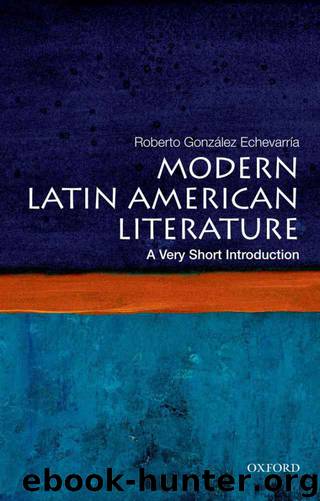Modern Latin American Literature: A Very Short Introduction (Very Short Introductions) by Roberto Gonzalez Echevarria

Author:Roberto Gonzalez Echevarria
Language: eng
Format: mobi
Tags: A Very Short Introduction
ISBN: 9780199755028
Publisher: Oxford University Press
Published: 2012-01-13T07:00:00+00:00
Chapter 5
Latin American fiction in the twentieth century: Regionalism to Modernism
Prose fiction, except for the short story, fell behind poetry in the evolution of Latin American arts toward Modernism in the early part of the twentieth century; there were no equivalents to Pablo Neruda, César Vallejo, or Gabriela Mistral until the 1940s. In spite of the existence of a group of distinguished regionalist novelists, modern Latin American literature was thought to be then preeminently a literature of poets. Neruda and Mistral, with international recognition and living in countries like Spain, France, and the United States, drew most of the public attention.
When the novelists who brought about what has come to be known as the Boom of the Latin American novel changed this radically in the 1960s, it was because prose fiction caught up with the poetry, incorporating Modernist narrative techniques. It was not a sudden development, as the word would suggest, but a gradual one that began, tentatively in the thirties and forties, accelerated in the fifties, and came to full bloom in the sixties. Latin American fiction then contributed original features to the modern novel in the West, but this was partly due to its belated adoption of practices that had been common since Proust, Kafka, Joyce, and Faulkner. By the twenty-first century, Latin American prose fiction was in step with the rest of literature in the West, a full participant in the international, indeed global commerce of the arts.
In the early twentieth century, the Latin American short story continued under the sway of Rubén Darío and Modernismo. The new short-story writers were still intensely concerned with form, and their successors have continued to be so because, like poetry, the short story relies on the deployment of exacting techniques under the pressure of the need for brevity. Some of the short-story writers, like Leopoldo Lugones, were also poets. The most accomplished and influential writer of the period was the Uruguayan Horacio Quiroga (1878–1937), who wrote, perhaps tongue in cheek, a much-quoted “Decalogue of the Perfect Short Story Writer” (1917). The ambience of perversion, the ghoulishness, the presence of disease of both mind and body permeate Quiroga’s fiction and reveal the pervasive influence of Edgar Allan Poe.
Quiroga’s own life was fraught with violence: his father died in a hunting accident, and his stepfather committed suicide, as did Quiroga’s wife, and ultimately he himself, when he was terminally ill with cancer. Quiroga spent the requisite season in Paris but returned to live in the tropical jungle of Misiones in northern Argentina. Devoid of sentimentality and local color, his stories, are stark, tragic, shocking in their themes and rigorous execution. Cuentos de amor de locura y de muerte (Stories about Love, Madness, and Death) appeared in 1917, and Cuentos de la selva (Jungle Stories, translated as South American Jungle Tales) in 1918. In Quiroga’s stories the exquisite Modernista aesthetic has been cast aside to face the violent, turbulent natural and human landscape of Latin America with astonishing results. He continues to be regarded as a master of the genre, admired and imitated by writers of subsequent generations.
Download
This site does not store any files on its server. We only index and link to content provided by other sites. Please contact the content providers to delete copyright contents if any and email us, we'll remove relevant links or contents immediately.
| Books & Reading | Comparative Literature |
| Criticism & Theory | Genres & Styles |
| Movements & Periods | Reference |
| Regional & Cultural | Women Authors |
4 3 2 1: A Novel by Paul Auster(12354)
The handmaid's tale by Margaret Atwood(7727)
Giovanni's Room by James Baldwin(7299)
Asking the Right Questions: A Guide to Critical Thinking by M. Neil Browne & Stuart M. Keeley(5737)
Big Magic: Creative Living Beyond Fear by Elizabeth Gilbert(5721)
Ego Is the Enemy by Ryan Holiday(5390)
The Body: A Guide for Occupants by Bill Bryson(5065)
On Writing A Memoir of the Craft by Stephen King(4910)
Ken Follett - World without end by Ken Follett(4705)
Adulting by Kelly Williams Brown(4552)
Bluets by Maggie Nelson(4534)
Eat That Frog! by Brian Tracy(4499)
Guilty Pleasures by Laurell K Hamilton(4420)
The Poetry of Pablo Neruda by Pablo Neruda(4079)
Alive: The Story of the Andes Survivors by Piers Paul Read(4009)
White Noise - A Novel by Don DeLillo(3988)
Fingerprints of the Gods by Graham Hancock(3979)
The Book of Joy by Dalai Lama(3959)
The Bookshop by Penelope Fitzgerald(3827)
